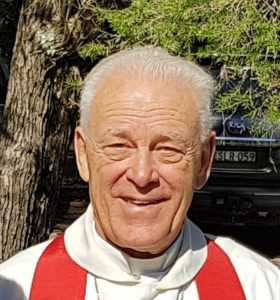Ascension Sunday
John 14: 2-3; 19-20; 16:16-24
Have you ever prepared for a big overseas trip? Before you leave a friend, family member or maybe even your travel agent would have sat you down to go over all of the things you need to remember: Passport, warm clothing money in a foreign currency, travel insurance, tickets, advice about where to go and where not to go, etc. You know it is all important, but it can be a bit overwhelming. And you know you will forget much of the advice. But somehow, when the time comes, the information will come back to you, and you will be glad you were told ahead of time what to expect.
In the case of Jesus it is he who will be going away. But he is the one giving advice to his disciples about what to expect when he is with the Father. He is concerned to tell his disciples, during his last meal with them before he would be betrayed and arrested, the things they would need know. And he had many things to tell them. For instance, the importance of serving and loving one another, the fact that he was going to die, and rise again, the coming of the Holy Spirit, and so many other things. Most of these things they would not have understood until later.
One of the things Jesus told his disciples on that night is that he would be leaving them and going to the Father. He was referring to his ascension into Heaven. This last Thursday was Ascension Day. I hope you didn’t forget to celebrate! But don’t worry if you missed it, because today is Ascension Sunday! It is a day on which we remember Jesus’ ascension into Heaven, and recall what Jesus told his disciples.
Jesus said: “A little while, and you will no longer see me, and again a little while, and you will see me.’
It sounds like the opening of an illusionist’s magic trick. “Now you see me, now you don’t!” But this is no magic trick. We will see Jesus, then we will not see him, then we will see him again. And this is because, as Jesus explained to his disciples, he is ‘going to the Father.’
Jesus had said something similar a little earlier in his conversation with the disciples. In John 14:19-20 he said, ‘In a little while the world will no longer see me, but you will see me. Because I live, you also will live. On that day you will know that I am in my Father, and you in me, and I in you.’
Of course, the disciples wondered what Jesus meant by these words. So they began discussing what Jesus had said among themselves. Jesus knew what they were talking about so he said to them: ‘Are you discussing what I meant which I said “A little while, and you will no longer see me, and again a little while, and you will see me?’
Then to explain his words, Jesus gave the disciples an illustration of a mother in labour (and it is an apt illustration for Mother’s Day!) Jesus wanted to remind them that sometimes things will be difficult, even painful. But we need to focus on what is coming. Often an expecting mother in the pain of labour will vow never again to go through this. But the moment the baby is born her whole perspective shifts. All the pain has been worthwhile. So for a mother, the birth of a precious new baby is what she has been waiting for, and when the baby is born it makes all the trouble and pain worthwhile.
Now, I am very grateful that Jesus accommodated the theme of Mother’s Day by giving this illustration. But honestly, it doesn’t seem like he answered the disciples’ question about what he meant by ‘in a little while you will no longer see me …’ Have you noticed that Jesus often does that? He is asked one question, but then seems to answer another one altogether. By this point I think the disciples were used to it. And something they had come to realise was that, upon reflection, Jesus really had answered their question. And this is the same thing here.
The disciples wondered what Jesus meant by ‘a little while.’ They were concerned about literal time. Just how long would Jesus be gone for? And where was he going? These would be the obvious questions any of us would have if a friend said to us that they will be going away for a little while. But Jesus answers the deeper question. The question they should have been asking. That is, what will it be like for us when you have gone? And what will you be doing? The disciples wanted to know about the ‘quantity’ of ‘a little while’. Jesus tells them about the quality of this little while. He tells them what it will mean for them that he will be ascending to the Father. And to do that, he turns to the illustration of a mother giving birth. Everyone can relate to that. Most of us are not mothers. But recent studies have shown that the overwhelming majority of all people have a birth mother. I believe the figure was somewhere around 100%! So this illustration Jeus used is something we can all relate to. And if we have been lucky enough to know our birth mothers, we were probably told (perhaps on those occasions when we were not showing proper appreciation for our mothers) just how difficult it was to bring us into the world. So we know that giving birth is very difficult. But we also know that as soon as a new baby is born, it is all worthwhile. That is what the expectant mother had been looking forward to for all those months.
Well, Jesus is telling us that that is what it will be like for us. Things will not always be easy for us during this ‘little while’ in which he is away. In fact, they will often be very difficult. But for those of us who follow Jesus, it is his return to us that we wait for – that we are looking forward to. It is Jesus’ return that makes everything worthwhile. It may be hard for us to imagine now, but when that day comes, all the difficulties and pain of this life will seem like nothing in comparison to the joy we will then have.
This is the point of the ascension of Jesus to Heaven. It is not about Jesus being gone from us. It is about where Jesus is now and what he is doing for us now. And that is why we do not commemorate the Ascension as the sad occasion of Jesus leaving us. But we celebrate it as something very positive and exciting.
Jesus explains to his disciples that because he is going the Father, this is a good thing. It means that he is taking up his place again in Heaven. It means we can ask anything of the Father in Jesus’ name. He tells his disciples to ask that they might receive, and that their joy might be complete.
Jesus is telling his disciples that while it might be difficult not having him with them physically, there are also advantages to his being away. Instead of focusing simply on the fact that Jesus is no longer with us on this earth, he asks us to think about where he is: Jesus is with the Father in the heavenly kingdom. Jesus has not left or abandoned us. He is preparing a place for us. We read in John 14:2-3 that Jesus told his disciples: ‘In my Father’s house there are many dwelling places. If it were not so, would I have told you that I go to prepare a place for you? And if I go and prepare a place for you, I will come again and take you to myself.’
Because Jesus has ascended to the Father, we know that he is speaking on our behalf, we know that he is preparing a place for us, and we know that he will come again.
The Ascension is not a reminder that Jesus has somehow left us. It is, instead, a reminder of how Jesus is with us now. It is a reminder of what Jesus is doing for us now. And it is a reminder that Jesus will come again to us to take us unto himself.
Happy Ascension Sunday!
Amen.
Pastor Mark Worthing.
Port Masquarie.



